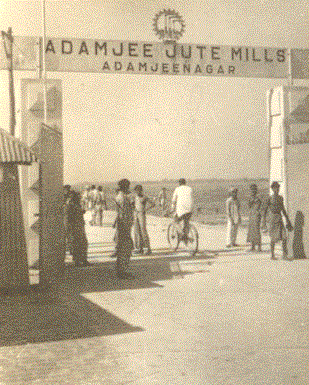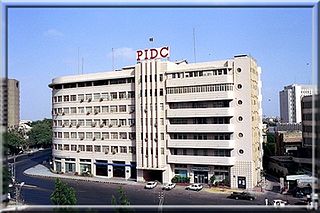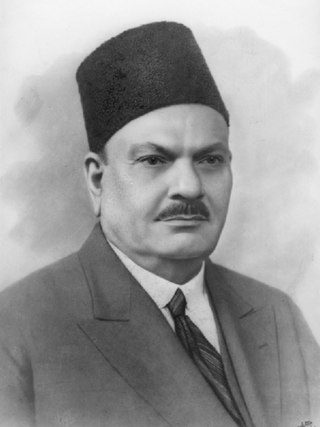Related Research Articles

East Pakistan was the eastern province of Pakistan between 1955 and 1971, restructured and renamed from the province of East Bengal and covering the territory of the modern country of Bangladesh. Its land borders were with India and Burma, with a coastline on the Bay of Bengal. East Pakistanis were popularly known as "Pakistani Bengalis"; to distinguish this region from India's state West Bengal, East Pakistan was known as "Pakistani Bengal". In 1971, East Pakistan became the newly independent state Bangladesh, which means "country of Bengal" or "country of Bengalis" in Bengali language.

The jute trade is centered mainly around India's West Bengal and Assam, and Bangladesh. The major producing country of jute is India and biggest exporter is Bangladesh, due to their natural fertile soil. Production of jute by India and Bangladesh are respectively 1.968 million ton and 1.349 million metric ton. Bengal jute was exported to South East Asia from the 17th century by the Dutch, French and later by other Europeans.

The Partition of Bengal in 1947, also known as the Second Partition of Bengal, part of the Partition of India, divided the British Indian Bengal Province along the Radcliffe Line between the Dominion of India and the Dominion of Pakistan. The Bengali Hindu-majority West Bengal became a state of India, and the Bengali Muslim-majority East Bengal became a province of Pakistan.
A jute mill is a factory for processing jute. There is evidence of jute fibre extraction dating back to the Han dynasty, with a fragment of jute paper being discovered in Dunhuang, in the Gansu Province. The first known mechanical jute mills are believed to have been converted Flax mills, the oldest possibly being establish in Dundee, after a contract was agreed with the East India Company, for the supply of jute as a substitute for then scarce flax, in 1820. By the mid-1800s jute mills were being established in British India, George Acland's Mill of 1855, at Rishra, being the oldest. The world's largest jute mill was the Adamjee Jute Mills at Narayanganj in Bangladesh, which closed all operations in 2002.

East Bengal was the eastern province of the Dominion of Pakistan, which covered the territory of modern-day Bangladesh. It consisted of the eastern portion of the Bengal region, and existed from 1947 until 1955, when it was renamed as East Pakistan. East Bengal had a coastline along the Bay of Bengal to the south, and bordered India to the north, west, and east and shared a small border with Burma to the southeast. It was situated near, but did not share a border with Nepal, Tibet, the Kingdom of Bhutan and the Kingdom of Sikkim. Its capital was Dacca, now known as Dhaka.

Adamjee Jute Mill was a jute mill in Bangladesh. It was established in Narayanganj in 1950 by the Adamjee Group. It was the second jute mill in East Pakistan after Bawa Jute Mill, which was the first Jute Mill in East Pakistan. Gradually, the mill became the largest jute mill in the world, exceeding the jute mills of Calcutta, India, and Dundee, Scotland. The mills were nationalised after the independence of Bangladesh in 1972. It was operated by the Bangladesh Jute Mills Corporation before being closed down in 2002.
Mirza Ahmad Ispahani (1898–1986) was a Perso-Bengali businessman based in Chittagong and the patriarch of the Ispahani family. He was the founder of Orient Airways and the first chairman of Pakistan International Airlines (PIA). He was the chairman of Ispahani Group.

Pakistan Industrial Development Corporation (PIDC) is a state corporation of Pakistan working under Ministry of Industries and Production.
The Saigol Group, also known as Kohinoor Group, is a Pakistani group of companies headquartered in Lahore. It was founded by Amin Saigol in the 1930s with a small shop that eventually developed into the Kohinoor Rubber Works.

Abul Kashem Khan was a Bangladeshi lawyer, industrialist and politician. In 1945, he founded A K Khan & Company, one of Pakistan's leading conglomerates until 1971, when it became one of Bangladesh's leading conglomerates. Khan served as a member of the Constituent Assembly of India and the Constituent Assembly of Pakistan. He was a federal minister of Pakistan and member in the Pakistan National Assembly.
Adamjee Group of Companies is a group of companies headquartered in Karachi, Pakistan. The group was previously headed by Sir Adamjee Haji Dawood.

Sir Adamjee Haji Dawood Bawany was a Pakistani businessman and philanthropist who founded Adamjee Group. He was also an activist in the Pakistan Movement.

Abdulhusein Meheraly Thariani was a member of the first generation of formally trained architects in Pakistan. Amongst his most prominent works is the Baitul Mukarram in Dhaka, Bangladesh.
Siddhirganj, is one of the oldest industrial cities of Bangladesh. It is located in the bank of Shitalakshya River, Narayanganj. The Siddhirganj Industrial Zone has more than 15 thousand factories and industrial establishments. Adamjee Jute Mills was established in Siddhirganj in 1951 and was once the largest jute mill in the world. This city is also one of the largest exporter in the country. In 2018–2019, the Adamjee export processing zone in Siddhirganj exported more than 4 billion US dollars' worth of goods.

The Port of Narayanganj is a river port in Narayanganj, Bangladesh. It is one of the oldest and busiest river ports in Bangladesh; and one of the major ports of the Bengal delta. The port is located on the Shitalakshya River. The port area is home to numerous industries.

Nishat Group is a group of companies headquartered in Lahore, Pakistan. The company was founded by Pakistani business magnate Mian Muhammad Yahya in 1951. Mian Muhammad Mansha is the current chairman of the group.
The Acland Mill was the first jute mill established in India. The mill was established in 1855 by British entrepreneur George Acland and Bengali financier Babu Bysumber Sen in Rishra, Bengal Presidency, British India.
The jute industry is a historically and culturally important industry in Bangladesh dating back to during the growth of the East India Company in the Indian subcontinent. Despite once being one of the country's biggest industries and major export items, the jute industry has declined since the 1970s. Exports have fallen as other countries grow jute independently, decreasing the demand for jute to be exported, and other products like plastics and hemp find more widespread use.

Mohammad Abdus Sattar, known as M. A. Sattar, was a prominent Bangladeshi business magnate and politician. He was the founding chairman and managing director of Sattar & Company Ltd., Sattar Jute Mills Ltd., Hasna Shipbuilding & Navigation Ltd., and Rangpur Industries Ltd. In the 1980s, Sattar held several cabinet ministry positions, was elected as a member of parliament twice, and was chief whip in President Ershad's government from 1988 to 1990.
Mohammad Keramat Ali was a Pakistani Bengali entrepreneur, philanthropist and politician. He was a member of the 4th National Assembly of Pakistan as a representative of East Pakistan.
References
- 1 2 3 4 "Abdul W. Adamjee, Pakistani Magnate, Millionaire, Is Dead". The New York Times. 5 July 1972. Retrieved 3 June 2018.
- 1 2 "The Adamjee Legacy". pmp.com.pk. Archived from the original on 27 February 2017. Retrieved 3 June 2018.
- ↑ Khan, Abdul Jamil (14 August 2013). "The forgotten leader". dawn.com. Retrieved 3 June 2018.
- ↑ Roy, Tirthankar (2017). The Economy of South Asia: From 1950 to the Present. Springer. p. 272. ISBN 9783319547206.